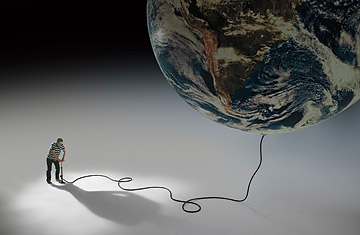
(3 of 3)
Plug-in hybrid automobiles, nearly ready for the market, have the potential to quadruple our miles per gallon. Solar energy, concentrated by rapidly improving systems of parabolic mirrors, could be deployed in Africa's great desert and dry-land regions to provide electricity for Africa and Southern Europe at a cost competitive with fossil fuels. New land-management strategies, backed by modest financial incentives, could end most of today's tropical deforestation, which now contributes around one-fifth of all global carbon emissions as well as causing a massive loss of biodiversity. And all these steps to sustainable energy, according to today's best economic and engineering evidence, can be implemented for less than 1% of annual world income.
Beyond Markets
If the solutions are so attainable, why haven't we reached them already? Part of the reason is that we are facing our problems in the wrong way. We are so convinced that the problems are intractable—or deathly expensive to solve—that paralysis reigns. Even when we are aware of what needs to be done, we are often trapped by a free-market ideology, the same kind of no-regulation policy that has led us into our current financial crisis.
On the three great challenges—environmental sustainability, a stable world population and the end of extreme poverty—market forces will not be enough. The world's producers and consumers currently regard the air as a free dumping ground for carbon dioxide and other climate-changing greenhouse gases. We need to correct market forces—for example, by taxing carbon emissions that are offset by tax reductions elsewhere—in order to create the right incentives. We need to expand greatly our public investments in early-stage clean technologies, such as improved solar-thermal power and carbon capture and sequestration, just as the National Institutes of Health uses public funding to support medical breakthroughs.
Similarly, population stabilization in poor countries requires a determined public investment—in girls' education, health services and child survival—to promote a rapid and voluntary reduction in birth rates. And we should first help the poorest of the poor to get above survival levels of income before we can expect market forces to lift them further, to market-driven prosperity.
None of this is expensive, but none of it can happen by itself. Indeed, it is the low cost of success that is perhaps the most remarkable feature of all. Consider malaria, the great African killer disease. Three hundred million antimalaria bed nets are needed to protect impoverished Africans from the disease. Each net costs $5 and lasts five years, for a total cost of $1.5 billion over five years. Yet that is less than one day's Pentagon spending! Add in the costs of medicines and ongoing delivery services, and we find that comprehensive malaria control would cost less than two days' Pentagon spending each year. Sustainable development will not break the bank. The key is, rather, to make the right choices in our public investments and to find ways to harness, and channel, market forces.
The Power of One
Great social transformations—the end of slavery, the women's and civil rights movements, the end of colonial rule, the birth of environmentalism—all began with public awareness and engagement. Our political leaders followed rather than led. It was scientists, engineers, church-goers and young people who truly led the way. If as citizens we vote for war, then war it will be. If instead we support a global commitment to sustainable development, then our leaders will follow, and we will find a way to peace.
Each of us has a role to play and a chance for leadership. First, study the problems—in school, in reading, on the Web. Second, when possible, travel. There is no substitute for seeing extreme poverty, or deforestation, or the destructive forces of nature in New Orleans, to understand our generation's real challenges. There is no substitute for meeting and engaging with people across cultures, religions and regions to realize that we are all in this together. Third, get your business, community, church or student group active in some aspect of sustainable development. Americans are promoting the control of malaria, the spread of solar power, the end of polio and the reversal of treatable blindness, to name just a few of today's inspiring examples of private leadership. Finally, demand that our politicians honor our nation's global promises and commitments on climate change and the fight against hunger and poverty. If the public leads, politicians will surely follow.
Our generation's greatest challenges—in environment, demography, poverty and global politics—are also our most exciting opportunity. Ours is the generation that can end extreme poverty, turn the tide against climate change and head off a massive, thoughtless and irreversible extinction of other species. Ours is the generation that can, and must, solve the unresolved conundrum of combining economic well-being with environmental sustainability. We will need science, technology and professionalism, but most of all we will need to subdue our fears and cynicism. John F.Kennedy reminded us that peace will come by recognizing our common wealth. "If we can not end now our differences, at least we can help make the world safe for diversity. For, in the final analysis, our most basic common link is that we all inhabit this small planet. We all breathe the same air. We all cherish our children's future. And we are all mortal."
Sachs, author of The End of Poverty, directs the Earth Institute at Columbia University